
The Schust family entertained the Andover Historical Society during our annual meeting. It was supposed to be a talk on “Railroads 101” from our own Fred Nystrom, but due to illness he couldn’t give the planned presentation. The Schust Family stepped in at the last minute to talk about drumming and how it started in Andover, and how their family brought cross-cultural African and Caribbean drumming to the Andover community. They were at the forefront of bringing drumming to Andover. In the 90’s, they formed a drum group of local people who met in the Proctor Chapel to learn African rhythms. It was a great way to bring people together in town. The drums speak a universal language. Drums are also used for healing and stress relief.

In the early 80’s Grace was introduced to African drumming at a weeklong drumming conference given by Babatunde Olatunji, well-known Nigerian drummer and leader of the “Drums of Passion”, a group that Grace had first seen at the 1965 World’s Fair. Baba introduced many people to drumming across the world. The Schust’s started building drums and built Grace’s first drum out of Curly Maple, Padauk and purple heart wood. Their company was called Timbre Drums. They made many drums for people in Andover and built drums for Baba.
Grace was handed over the Andover Creative Arts Association. She revamped the non-profit and started Arts Bridge the World which began the cross-cultural exchange by hosting a Haitian drumming and dancing group at Andover Elementary/Middle School. Some teachers were worried about the drummers coming because of the misconception of Haitian music as being black magic or voodoo. The folkloric drummers got all the kids dancing and singing. They were very popular, and when the drummers were outside during recess, the students made a long line around the building to get their autographs.
Grace recalled driving a group of Nigerian “talking drummers” to UNH for a concert and workshop. The talking drum can change pitch and mimic the Yoruba language which has specific pitches for words (known as a tonal language). They were all listening to some drumming music that they had brought with them on a tape. Everyone was silent in the car, and then suddenly the drummers were yelling at each other. There was silence for about 5 more minutes and then the yelling started again. Grace asked, “What is going on? What is all the yelling about?” It turns out, the drumming tape was a letter played on a talking drum” by the father of Sikiru, one of the drummers in the car. His father was complaining about Sikiru’s brother, which caused the argument. Sikiru explained that his father had only spoken to him using the talking drum since birth. The talking drum tradition is slowly dying due to modern life. These cross-cultural drumming programs help to carry on the ancient culture.
It was a wonderful evening, and they brought drums and other hand percussion instruments for everyone to play. They taught the AHS a few rhythms and songs. As a nod to railroad history, they taught a song “Akiwowo” about the first conductor of trans-Nigerian railroad.